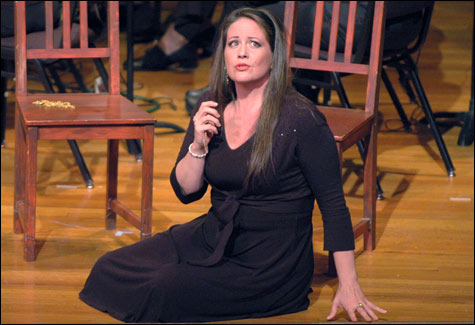
COSÍ FAN TUTTE: The biggest hand went to Fiordiligi Lauren Skuce, who was strong and
uninhibited, though not much seemed felt. |
Craig Smith’s Emmanuel Music began its season with Bach, the composer it’s best known for. But Bach’s Der Kunst der Fuge (“The Art of the Fugue”) is better known for not being played at all. Bach left his last work — a 14-part exploration of and testament to the fundamental element of counterpoint in his compositional practice — unfinished, left it without even an indication of what instrument (or instruments) it was written for. It’s been recorded on harpsichord, piano, and organ; by string quartets; by chamber orchestras — but it’s seldom done live. It’s just too difficult. Emmanuel solved this problem by having it played by 13 distinguished pianists, all of whom donated their services to benefit Emmanuel Music. The honor roll, in order of appearance: Sergey Schepkin (who played both the quiet first fugue and the staggeringly complex last fugue, which begins with a return of the hushed opening theme), Robert Merfeld, Sally Pinkas, John Harbison, Bruce Brubaker, Michael Lewin, Katherine Chi, Judith Gordon, Yehudi Wyner, Ya-Fei Chuang, Robert Levin, Leslie Amper, and Randall Hodgkinson.Given the nature of the work itself, and Bach’s architectonic mastery, the evening was an intense and complex experience, moving and meditative — but also, given Bach’s range of effect and affect, enormously enjoyable, even, in parts, fun. Each pianist was well suited to the section he or she chose or was assigned: Schepkin’s poetic delicacy; Chi’s combination of clarity (you could hear every line in one of the most challenging of all the fugues and canons), elegance, and solemnity; Harbison’s textured inwardness; Gordon’s intellectual and physical energy; Wyner’s whirlwind rhythmic passion; Chuang’s lightness of touch; Levin’s dramatic urgency.
Yet despite all the individual, sometimes quirky differences, what emerged was mysteriously unified. For nearly two hours, the Emmanuel audience listened rapt as Bach kept pushing the limits of what he could do, of his own understanding. And when Schepkin finally broke off where Bach did, mid phrase, you could almost hear a collective gasp.
Music director Martin Pearlman assembled a cast of fearless young singers for Boston Baroque’s latest version of Mozart’s Cosí fan tutte, and stage director Ned Canty got them to throw themselves into their parts. The audience stood and cheered at the end of a long, uncut evening that offered some three hours of music.
A good performance of Cosí should be at the same time hilarious and heartbreaking. With stabbing key changes and piercing harmonies, Mozart darkens — and humanizes — Lorenzo da Ponte’s devastating satirical farce about two young men who are convinced of the absolute fidelity of their lovers before being disabused of their illusions.
In Boston Baroque’s last Cosí, in 1998, Pearlman’s conducting lacked musical innuendo and insinuation (in Mozart’s most insinuating operatic score), and it glossed over those uncanny harmonic shocks. He still straitjackets Mozart’s most subversive surprises and trots rather briskly past the passages of sublime repose. Canty — borrowing a lot from Peter Sellars’s inspired updating, even having the two boys disguise themselves as Saturday Night Live’s “wild and crazy guys” (isn’t it time to update the updating?) — was by turns broadly farcical and heavy-handedly tragic, but never both at once. The first act was pure sit-com (Friends, Cheers), the singers’ exaggerated mugging far from the elegance and humanity of Mozart and da Ponte; the second act sagged into anguished soul searching. (Were these the same characters?) Canty played Mozart’s ambiguous ending oddly straight, reuniting the original couples as if each had not in the meantime fallen in love with someone else. Didn’t the previous three hours of music yield any new insight?
The biggest hand went to New York City Opera soprano Lauren Skuce, who sang her previous Fiordiligi at Tanglewood last summer under James Levine. (She was also the sexy Morgana in Boston Baroque’s 2003 Handel Alcina.) She’s impressive: vocally strong up and down the scale and uninhibited, though not much seemed felt. Mainly she played for laughs. Like most of the cast, she sang almost everything too loud, with a tendency to swell even her quietest phrases into big climaxes. I wish she had sung everything with the concentration and emotional honesty of her second-act “Per pietà.”
Tenor Vale Rideout had the unenviable task of singing all three of Mozart’s arias for Ferrando (the two hardest are usually cut), and on two nights in a row. Night two, his high notes were beginning to fray. “Un aura amorosa,” the aria that captures a moment of introspective wonderment, was too forceful and fast to be transcendent. Hugh Russell (Guglielmo), Jennifer Holloway (an adorably dim Dorabella), recent BU graduate Sara Heaton (Despina), and especially Kevin Burdette (a manic Don Alfonso, the “rational” figure who precipitates and stage-manages the bet that will entrap both pairs of lovers) all worked hard and sang well. The chorus was outstanding; the wind playing was superb. Michael Beattie, accompanying the recitatives on fortepiano, embodied more of Mozart’s subtlety, delicacy, and insinuation than anyone else on stage.